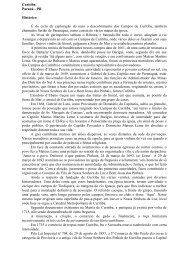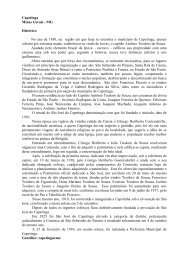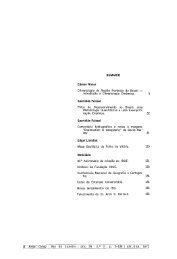STATÍSTICAS NAS MÉRICAS - Biblioteca - IBGE
STATÍSTICAS NAS MÉRICAS - Biblioteca - IBGE
STATÍSTICAS NAS MÉRICAS - Biblioteca - IBGE
You also want an ePaper? Increase the reach of your titles
YUMPU automatically turns print PDFs into web optimized ePapers that Google loves.
Introdução / introduction<br />
***<br />
Na primeira parte, “Abordagens<br />
historiográficas”, há seis textos,<br />
todos eles, de uma forma ou de<br />
outra, oferecendo ferramentas<br />
teórico-metodológicas para a escrita<br />
da história das estatísticas, além de<br />
reflexões que permitem compreender<br />
sua consagração como objeto no<br />
pensamento social e na historiografia.<br />
Como em toda proposta de modelos<br />
em história, também aqui a discussão<br />
dos métodos sugeridos está atrelada<br />
à análise dos processos sociais e<br />
referidos aos contextos nacionais ou<br />
regionais das Américas.<br />
O primeiro texto, de Jean-<br />
Pierre Beaud e Jean-Guy Prévost,<br />
“L’histoire de la statistique canadienne<br />
dans une perspective internationale<br />
et panaméricaine”, traz a idéia<br />
de “regime estatístico”, focando<br />
a configuração de um complexo<br />
formado por estruturas, normas<br />
(processos) e práticas estatísticas. Os<br />
regimes vigorariam em simultaneidade<br />
(ou, ao menos, proximidade) nos<br />
países ocidentais e seriam de quatro<br />
tipos: o pré e proto estatístico (até<br />
1840-1860), o de nacionalização<br />
estatística (1840-1860 a 1920-1940),<br />
o de macro-management estatístico<br />
(1920-1940 a 1980-1990) e o de<br />
mundialização neoliberal (a partir<br />
de 1980-90). Os autores propõem<br />
uma análise das transformações<br />
institucionais das sociedades vistas<br />
a partir de modalidades estatísticas<br />
de questionamento do mundo. Essa<br />
noção de “regime de informação” é<br />
muito cara à ciência da informação,<br />
com realce aos estudos de Bernd<br />
be in effect simultaneously (or, at<br />
least, closely) in Western countries:<br />
pre- and proto-statistical (up to<br />
1840-1860), statistical nationalization<br />
(1840-1860 to 1920-1940), statistical<br />
macro-management (1920-1940<br />
to 1980-1990) and neo-liberal<br />
globalization (from 1980-90). The<br />
authors propose an examination<br />
of institutional transformations of<br />
societies considered from statistical<br />
modalities of world questioning.<br />
This notion of “information regime”<br />
is highly valued in Information<br />
Science, especially in studies by<br />
Bernd Frohmann (also Canadian) 1 .<br />
Its application to historical studies,<br />
as have been made by Beaud and<br />
Prévost, included in the text in<br />
this book, is quite promising. Its<br />
use in Canadian statistics suggests<br />
application to other countries.<br />
The second text, by Hernán<br />
Otero, “History of statistics at<br />
universities and national statistics<br />
offices. The Argentine case”, analyzes<br />
the historiographic production of<br />
statistics in Argentina, indicating<br />
possible reasons for the nearly<br />
exclusive predominance of academic<br />
studies in the sector. Otero presents<br />
and discusses the main investigation<br />
matrices of this production, assessing<br />
the prevailing trends in his country:<br />
conceptual history of collection<br />
instruments and of classification<br />
1 Nelson Senra, in his book O saber e o poder das<br />
estatísticas, published in Rio de Janeiro, by <strong>IBGE</strong><br />
on 2005, dedicates part V to notions of regime,<br />
and information policy, without giving them a<br />
historical application.



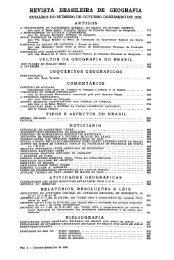
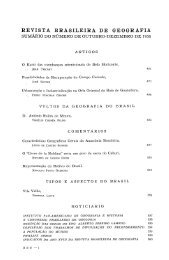



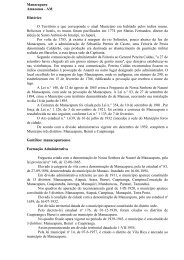
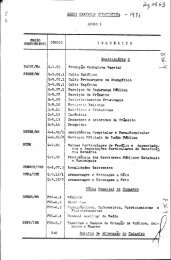
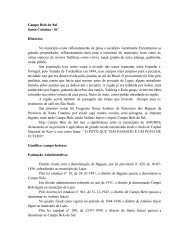
![Manual de Estatística [Fillippo Virgillii] - Biblioteca do IBGE](https://img.yumpu.com/17097551/1/185x260/manual-de-estatistica-fillippo-virgillii-biblioteca-do-ibge.jpg?quality=85)

